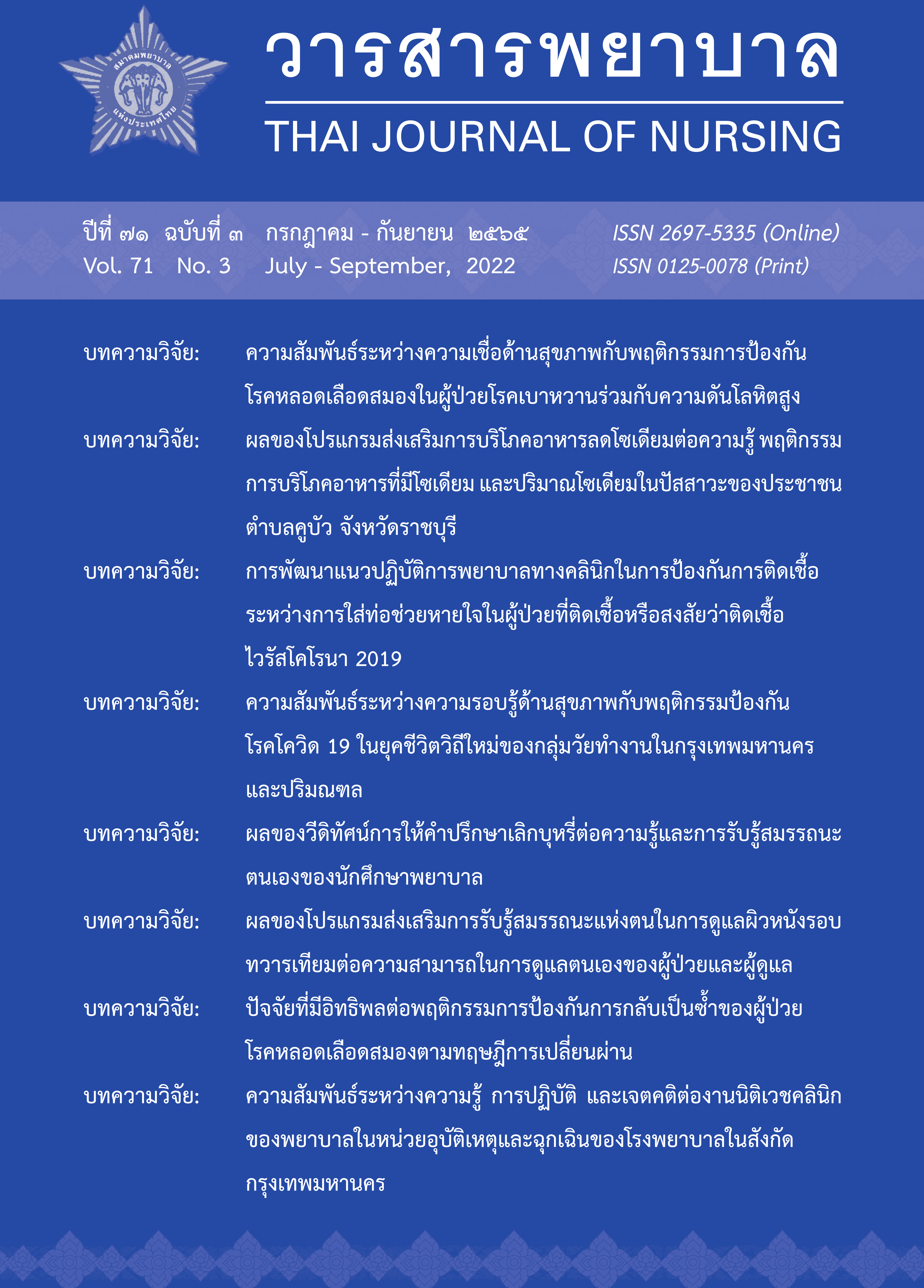The effects of self-efficacy promotion program toward the stoma skin care on self-care ability of patients and caregivers
Main Article Content
Abstract
This quasi-experimental research aimed at assessing the effects of self- efficacy promotion program toward the stoma skin care on self-care ability of patients and caregivers. The subjects were new patients who had been postoperative ostomy surgery and their caregivers at surgery department Udon Thani Hospital. A total of 52 colostomy patients and caregiver’s dyads were purposively selected into a control group (n = 26) and experimental group (n = 26). The control group received routine care only while the experimental group received routine care and the self-efficacy promotion program toward the stoma skin care. The program applied Bandura's Self-Efficacy Theory as the conceptual framework. Research instruments of patients and family caregivers consisted of the self- efficacy promotion program, the stoma skin care skill, and self-care ability of the stoma skin. Data were analyzed using descriptive statistics, Chi-square test, t-test, and Mix repeated measure ANOVA. Results: The experimental group's post-intervention stoma skin care skill and self-care ability were significantly higher than its pre-intervention score (p < .01), and significantly higher than that of the control group (p < .01).
Article Details

This work is licensed under a Creative Commons Attribution-NonCommercial-NoDerivatives 4.0 International License.
References
เกศิณี ธีรทองดี, จันทนา รณฤทธิวิชัย, วิไลวรรณ ทองเจริญ, และคนึงนิจ พงศ์ถาวรกมล. (2557).
ปัจจัยทำนายคุณภาพชีวิตของผู้สูงอายุโรคมะเร็งลำไส้ใหญ่และทวารหนักที่ได้รับการผ่าตัด
เปิดทวารเทียมทางหน้าท้อง. วารสารโรคมะเร็ง, 34(2), 68-78.
จุฬาพร ประสังสิต, และกาญจนา รุ่งแสงจันทร์. (2558). การพยาบาลผู้ป่วยที่มีลำไส้และรูเปิดทาง
หน้าท้อง: ประสบการณ์จากผู้เชี่ยวชาญ. กรุงเทพมหานคร: พี. เอ.ลีฟวิ่ง.
นงพิมล นิมิตอานันท์. (2560). การเตรียมจำหน่ายออกจากโรงพยาบาล: แนวคิดและแนวปฎิบัติ
ทางการพยาบาล. วารสารมหาวิทยาลัยคริสเตียน, 23(3), 501-510.
ศิริพรรณ ภมรพล, บังอร น้อยอ่ำ, และประพนธ์ กาญจนศิลป์. (2564). ผลของโปรแกรมส่งเสริมการ
รับรู้สมรรถนะแห่งตนต่อความสามารถในการดูแลตนเองของผู้ที่มีทวารเทียมรายใหม่. วารสาร
สภาการพยาบาล, 36(1), 52-70.
สุจินดา ลดาสุนทร, นิโรบล กนกสุนทรรัตน์, และสุชิรา ชัยวิบูลย์ธรรม. (2561). ผลของโปรแกรม
การสื่อวีดิทัศน์ช่วยสอนต่อความรู้และทักษะการดูแลทวารเทียมในญาติผู้ดูแลผู้มีทวารเทียม
รายใหม่. รามาธิบดีพยาบาลสาร, 25(1), 43-57.
Bandura, A. (1997). Self-efficacy: The exercise of control. New York: W. H. Freeman.
Burch, J. (2014). Stoma care in the community. British Journal of Community
Nursing, 19(8), 396–400.
Carvalho, D. S., Silva, A. G. I., Ferreira, S. R. M., & Braga, L. C. (2018). Elaboration
of an educational technology for ostomized patients: Peristomal skin care.
Revista Brasileira de Enfermagem, 72, 427-434.
Culha, I., Kosgeroglu, N., & Bolluk, O. (2016). Effectiveness of self-care education
on patients with stomas. IOSR Journal of Nursing and Health Science, 5(2),
-76.
He, L. J., Zheng, M. C., Wong, F. K. Y., Ying, J., & Zhang, J. E. (2021). Immediate
postoperative experiences before discharge among patients with rectal
cancer and a permanent colostomy: A qualitative study. European Journal of
Oncology Nursing, 51, 101911. doi: 10.1016/j.ejon.2021 .101911
Orem, D. (1985). Nursing: Concept of practice (3rd ed.). New York: McGraw-Hill.
Polit, D. F., & Beck, C. T. (2017). Nursing research: Generating and assessing
evidence for nursing practice (10th ed.). Philadelphia: Wolters Kluwer Health.
Pipi, A., Asimakopoulou, E., Argyriadis, A., Bellou, P., Gourni, M., & Sapountzi-
Krepia, D. (2021). Quality of life in patients with colostomy and the effects in
everyday life. Rostrum of Asclepius / Vima tou Asklipiou, 20(1), 44-59.
Xia, L. (2020). The effects of continuous care model of information-based hospital-
family integration on colostomy patients: A randomized controlled trial.
Journal of Cancer Education, 35(2), 301–311.


